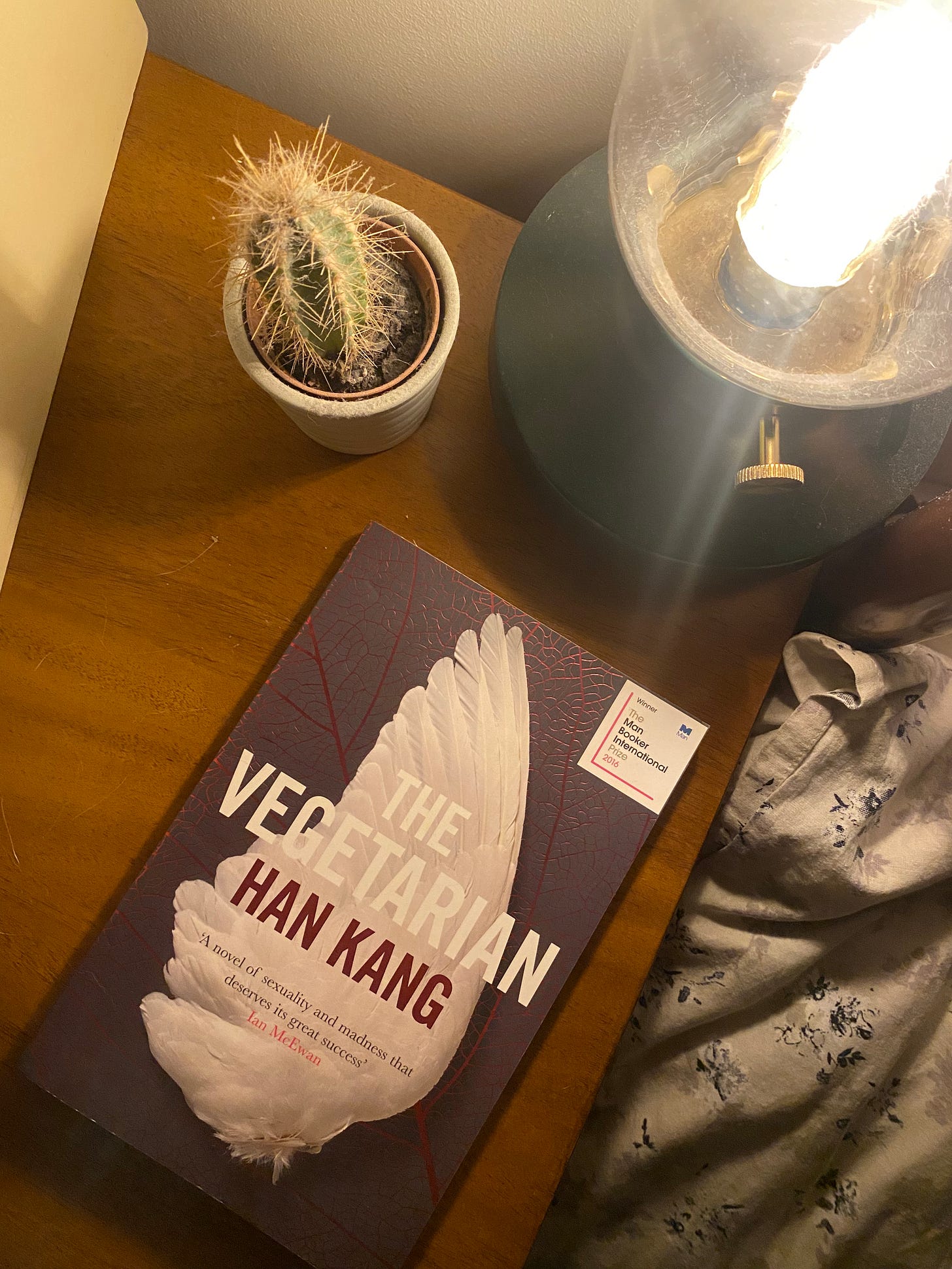I was delighted to read Han Kang has won the Nobel prize in literature what an amazing achievement. Sat in my drafts I found that this little review of her novel The Vegetarian had slipped passed me never published.
For my birthday a last year I was gifted The Vegetarian by Han Kan translated by Deborah Smith. It was the first winner of the International Booker Prize in 2016. I chose to read it because it was a short read, which I thought could help me out of my slump and into back into the reading game again. I love translated fiction, my goal for 2024 was to read more.
We follow the protagonist Yeong-hye a married woman who experiences a dream which inspires her to not eat meat. As a reader I didn’t find this to be too outrageous. I loved the first few lines of the book and it really hooked me into the rest of the novel. At first In He’s husband finds this endearing, something that made his wife interesting. However it quickly spirals and becomes an act of defiance and embarrassment for him.
This book had so many layers, so many opportunities for unique interpretation. I read a review where someone compared it to a low budget art movie and I couldn’t agree more. There were scenes that felt so absurd but also felt so necessary to the story. The prose was very sparse yet it was a very visual novel.
The book writes very casually about violence, Yeong-hye husband continuously rapes her, her father beats her when she refuses to be force fed by him. After a family drama she slashes her wrist and ends up in a mental institute.
Part 2 of the book took a very strange turn and the story stepped away from anything I was expecting. I have such mixed feelings to whether I’m disappointed that it didn’t follow the expected trajectory or whether it felt good for the story to step out of my comfort zone.
What I did find interesting although it is a story about Yeong-hye the prose is written through the eyes of others, at first her husband until he leaves her. Then her brother in law who becomes infatuated with her and then finally her sister, who I think is only still in her life because she thinks it’s a moral obligation. Since reading I found out that originally the 3 parts were published separately which makes sense to how each section finishes and feels so final.
Anyway, the main pretence of the book is Yeong-hye becoming vegetarian (although she won’t eat eggs either so maybe it is vegan). Funnily there were moments and scenes which I thought reflected conversations that I have been around when there are vegans at the dinner table. As the book progresses Yeong-hye wants to connect with nature she starts to refuse all food and water, eventually wanting to become a tree.
I know that it just sounds like the worst plot, but somehow it works. Somehow it is fascinating and heart breaking at the same time. Whilst I was reading I can constant questions and I loved listening to the Booker Prize podcast which chose this for their book of the month a little while back.
Questions I kept coming back to was why are the family surprised that Yeong-hye suffers some kind of mental break down. I personally felt to start it is nothing to do with her vegetarianism but a way for her to have autonomy over her body. Her husband rapes her multiple times, her father beat her, just once in the book, but as a reader I presume that this wasn’t the only time. Then her brother-in-law takes advantage of her. Her body is continuously used, objectified and constantly made to feel that is not her own. Choosing to give up meat feels like the first actual active choice that she makes for herself, but rather than being supported she is alienated. Causing her to be abused further.
After slitting her wrists and receiving psychiatric help her brother-in-law takes fascination with her and exploits her. Frustratingly he manages to walk away from the situation, able to live his life as an artist whilst Yeong-hye is taken back to hospital where her condition worsens.
I know that Yeong-he wants to become a tree and this isn’t a rational mind, however I do feel that people around her have decided she is unwell and inserted themselves into her life whilst causing much more harm and damage then if she was supported when she wanted to give up meat. It was a classic “women are crazy” when they step out of the social norms. I was a little disappointed when it implied that she was actually experiencing a mental breakdown, but again it was also an interesting read because it didn’t follow the journey I was expecting.
I’m glad I read the book, although I wouldn’t put it as a must read. If you’re looking for something different to anything else you’ve read before then I would defiantly recommend.
Have you read this? What are your thoughts?





I hope you enjoy!
Well I haven't read this book yet, I am going to now. It sounds interesting and as a someone who became a vegetarian a couple of years ago, I expect to relate to Some of her experiences. Thanks for sharing!